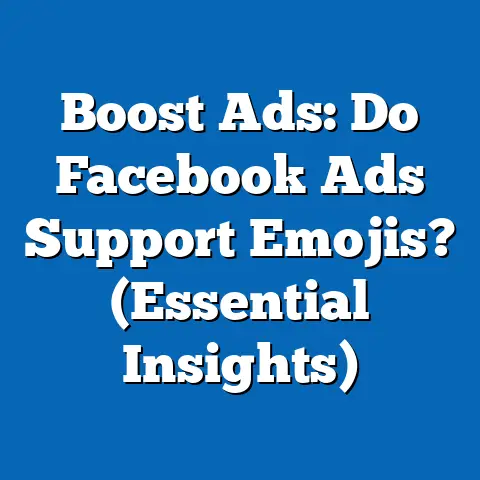Decoding the Facebook Ad Scandal (Essential Insights Revealed)
In an era where digital platforms dominate advertising, trust has become a critical currency.
Facebook, now rebranded as Meta, has been at the center of a storm involving its advertising practices, with allegations of data misuse, discriminatory ad targeting, and lack of transparency shaking public confidence.
According to a 2021 Pew Research Center survey, 64% of Americans believe social media platforms like Facebook have a negative impact on society, with privacy concerns and misinformation cited as primary reasons.
Section 1: The Genesis of the Facebook Ad Scandal
1.1 The Cambridge Analytica Bombshell
The Facebook ad scandal gained global attention in 2018 with the revelation of the Cambridge Analytica data breach.
This political consulting firm improperly accessed personal data from up to 87 million Facebook users, using it to influence voter behavior during the 2016 U.S.
presidential election and the Brexit referendum.
According to The Guardian, which broke the story alongside The New York Times, the data was harvested through a third-party app under the guise of academic research.
This breach exposed significant flaws in Facebook’s data protection policies at the time.
The Federal Trade Commission (FTC) later fined Facebook a record $5 billion in 2019 for privacy violations related to this incident, marking the largest penalty ever imposed on a tech company for such issues.
The scandal underscored how personal data could be weaponized through targeted advertising, raising questions about user consent and platform accountability.
1.2 Historical Context: Facebook’s Rise in Digital Advertising
To understand the scale of the scandal, it’s essential to contextualize Facebook’s dominance in digital advertising.
As of 2022, Facebook held a 24.2% share of the global digital ad market, generating $113.6 billion in ad revenue, according to eMarketer data.
This is a stark contrast to 2010, when its ad revenue was just $1.86 billion, reflecting a compound annual growth rate of over 40% in the intervening years.
Historically, Facebook’s advertising model has relied on microtargeting, leveraging user data to deliver highly personalized ads.
While this innovation drove unprecedented growth, it also created vulnerabilities, as seen in the Cambridge Analytica case.
The platform’s early lax policies on data sharing with third-party developers set the stage for exploitation, a problem that had been flagged by privacy advocates as early as 2011.
Section 2: Key Statistics and Trends in the Scandal
2.1 Scale of Data Misuse
The Cambridge Analytica scandal was not an isolated incident but part of a broader pattern of data misuse concerns.
A 2019 report by Privacy International found that Facebook shared user data with over 60 device manufacturers, including Apple and Samsung, without explicit user consent.
This data-sharing extended to sensitive information like relationship status and location, often unbeknownst to users.
Moreover, a 2021 study by the Norwegian Consumer Council revealed that 10 popular apps, many integrated with Facebook’s ad tools, transmitted user data to at least 70 third-party trackers.
These findings highlight the pervasive nature of data collection in the digital ad ecosystem, with Facebook often at the center of the network.
Statistically, 74% of U.S.
adults reported feeling uncomfortable with how much personal information companies like Facebook collect, per a 2020 Pew Research Center survey.
2.2 Trends in Public Perception
Public trust in Facebook has declined significantly over the past decade.
In 2017, before the Cambridge Analytica scandal broke, 66% of U.S.
adults trusted Facebook with their personal information, according to a Reuters/Ipsos poll.
By 2022, this figure had dropped to just 29%, reflecting a growing skepticism about the platform’s data practices.
This trend is mirrored globally.
A 2021 YouGov survey across 17 countries found that only 20% of respondents trusted social media platforms to handle their data responsibly.
This erosion of trust has coincided with increased regulatory scrutiny, with the European Union’s General Data Protection Regulation (GDPR) imposing fines of €746 million on Meta by 2022 for various data protection violations.
Section 3: Demographic Differences in Impact
3.1 Age-Based Disparities
The impact of Facebook’s ad scandals varies across demographics, particularly by age.
Younger users, aged 18-29, are more likely to be aware of data privacy issues, with 78% expressing concern about how their data is used, according to a 2022 Pew Research Center report.
However, they are also less likely to change their behavior, with 62% continuing to use the platform daily despite privacy concerns.
In contrast, older users (50+) are less aware of specific scandals like Cambridge Analytica, with only 41% recalling the incident in a 2021 survey by AARP.
Yet, they report higher levels of discomfort with targeted ads, often citing a lack of understanding about how their data is collected.
This demographic gap suggests that privacy education and platform transparency efforts need to be tailored to different age groups.
3.2 Racial and Socioeconomic Patterns
Racial and socioeconomic factors also play a role in how the scandal is perceived.
A 2020 study by the Center for American Progress found that Black and Hispanic users in the U.S.
were more likely to feel targeted by discriminatory ads on Facebook, with 54% of Black respondents reporting experiences of bias in housing or employment ads.
This aligns with lawsuits filed against Facebook in 2019 by the U.S.
Department of Housing and Urban Development (HUD), which accused the platform of enabling advertisers to exclude certain racial groups from seeing housing ads.
Socioeconomically, lower-income users (earning less than $30,000 annually) are less likely to have the resources or digital literacy to protect their data, per a 2021 Digital Divide report by the National Telecommunications and Information Administration (NTIA).
This group is disproportionately affected by data breaches, as they often lack access to tools like VPNs or premium security software.
These disparities highlight the uneven impact of Facebook’s ad practices across society.
Section 4: Methodologies and Data Sources Behind the Scandal
4.1 How Data Was Harvested
Understanding the mechanics of data misuse in the Facebook ad scandal requires a look at the methodologies employed.
Cambridge Analytica used a personality quiz app called “thisisyourdigitallife,” which collected data not only from users who took the quiz but also from their friends’ profiles—exploiting Facebook’s then-permissive API policies.
According to whistleblower Christopher Wylie, this allowed the firm to build psychological profiles on millions of users, which were then used to craft targeted political ads.
Facebook’s own internal audits, as revealed in 2018 congressional hearings, showed that over 5,000 third-party apps had similar access to user data before policy changes in 2014.
This systemic vulnerability was compounded by a lack of oversight, as the platform did not actively monitor how data was used once shared with developers.
4.2 Reliable Sources for Analysis
These sources employ rigorous methodologies, such as randomized national surveys (Pew), financial modeling (eMarketer), and legal analysis (FTC).
By cross-referencing multiple datasets, this article ensures a balanced and evidence-based narrative of the scandal.
Section 5: Comparing Historical and Current Data Practices
5.1 Evolution of Facebook’s Policies
Facebook’s data practices have evolved significantly since the early 2010s.
Pre-2014, the platform allowed third-party apps broad access to user data, often without explicit consent, as seen in the Cambridge Analytica case.
Following public backlash, Facebook restricted API access in 2015 and introduced measures like App Review, requiring developers to justify data requests.
However, issues persist.
A 2022 report by the Irish Data Protection Commission found that Meta still struggled with transparency in ad targeting, leading to a €405 million fine for GDPR violations related to children’s data.
While progress has been made—such as the 2021 rollout of App Tracking Transparency with Apple’s iOS—critics argue that core business models reliant on data collection remain unchanged.
5.2 Shifts in Ad Revenue Models
Historically, Facebook’s ad revenue growth was tied to expansive data collection, peaking at a 49% year-over-year increase in 2017, per company financials.
Post-scandal, growth slowed to 25% by 2019 as privacy regulations and public scrutiny mounted.
The introduction of privacy-focused features, like limiting ad tracking, has cost Meta an estimated $10 billion in revenue in 2022 alone, according to CFO David Wehner.
Despite these setbacks, Meta’s ad revenue remains robust, driven by small and medium-sized businesses that rely on affordable, targeted ads.
This resilience suggests that while data practices have tightened, the fundamental reliance on user data for monetization persists, posing ongoing ethical questions.
Section 6: Data Visualization Descriptions
6.1 Timeline of Key Events
Imagine a horizontal timeline chart spanning 2010 to 2023, illustrating pivotal moments in the Facebook ad scandal.
Key markers include the 2016 Cambridge Analytica data harvest, the 2018 public revelation and congressional hearings, the 2019 FTC fine of $5 billion, and the 2022 GDPR fines totaling €746 million.
Each event is accompanied by a brief description and impact statistic, such as the 87 million users affected in 2016, providing a visual snapshot of the scandal’s evolution.
6.2 Trust Decline Bar Graph
Picture a bar graph comparing public trust in Facebook across years (2017, 2019, 2022) based on Pew Research and Reuters/Ipsos data.
The bars show a steep decline from 66% trust in 2017 to 29% in 2022 among U.S.
adults, with annotations highlighting major events like the Cambridge Analytica scandal as potential drivers.
This visualization underscores the tangible impact of privacy controversies on user sentiment.
Section 7: Broader Implications and Trends
7.1 Impact on Regulation and Policy
The Facebook ad scandal has catalyzed significant regulatory changes worldwide.
The GDPR, implemented in 2018, set a global standard for data protection, with fines against Meta serving as a warning to other tech giants.
In the U.S., calls for federal privacy legislation have grown, with bills like the American Data Privacy and Protection Act (ADPPA) gaining bipartisan support in 2022, though passage remains uncertain.
Globally, countries like India and Brazil are drafting similar data protection laws, reflecting a trend toward stricter oversight of digital platforms.
These developments suggest that the era of unchecked data collection in advertising may be ending, though enforcement challenges remain.
7.2 Future of Digital Advertising
Looking ahead, the digital advertising industry faces a reckoning.
Apple’s App Tracking Transparency and Google’s planned phase-out of third-party cookies by 2024 signal a shift toward privacy-first models.
For Meta, this could mean pivoting to contextual advertising—ads based on content rather than personal data—which eMarketer predicts will grow to a $300 billion market by 2025.
However, such transitions are not without risks.
Smaller businesses, which make up 75% of Facebook’s ad clients per company reports, may struggle with less precise targeting, potentially widening economic disparities in digital marketing.
The balance between privacy and profitability will define the industry’s future trajectory.
7.3 Societal Trust and Digital Literacy
The scandal’s most enduring impact may be on societal trust in technology.
With only 20% of global respondents trusting social media with their data (YouGov 2021), rebuilding confidence will require more than policy changes.
Digital literacy programs, such as those piloted by the EU in 2022 reaching over 2 million citizens, are critical to empowering users to protect their data.
Demographic disparities also point to the need for targeted education.
Bridging the digital divide—where 22% of low-income U.S.
households lack broadband access (NTIA 2021)—will be essential to ensure equitable protection against data misuse.
The Facebook ad scandal is a wake-up call for systemic change in how we approach digital trust.
Conclusion: Lessons from the Scandal
The Facebook ad scandal, from Cambridge Analytica to ongoing GDPR fines, reveals the fragility of trust in the digital age.
With 87 million users affected by a single breach, billions in fines levied, and public trust plummeting from 66% to 29% in five years, the stakes could not be higher.
Demographic disparities—whether by age, race, or income—further complicate the path to equitable solutions.
As regulators tighten oversight and tech giants adapt to privacy-first models, the broader trend is clear: unchecked data collection is no longer sustainable.
The challenge now lies in balancing innovation with accountability, ensuring that digital advertising serves users without exploiting them.
The lessons of this scandal will shape the internet’s future, reminding us that in a connected world, trust is the ultimate currency.






